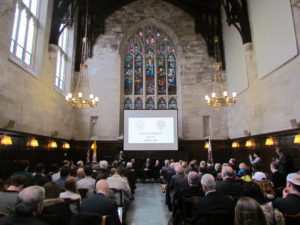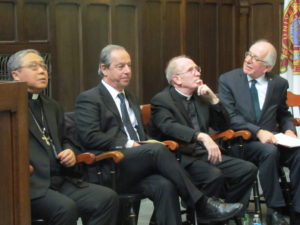
Last week, Centesimus Annus Pro Pontifice (CAPP) Foundation and Fordham University co-sponsored a conference with the theme “An Ethical Compass for the Digital Age”. The goal of the conference was to define, in practical terms, the role of ethics and Catholic Social Teaching in today’s economy. On Thursday, March 15th, 2018, business and professional leaders met with academic economists and experts on Catholic Social Teaching to lay the groundwork for their discussions.

Our global community faces many macro-level challenges, among them a growing population of refugees and migrants, mass unemployment, human rights violations, and growing polarization. Those living in poverty and extreme poverty are disproportionately affected by these global challenges. Archbishop Bernadito Auza, Permanent Observer of the Holy See to the United Nations, proposed that the tenants of Catholic Social Teaching remain relevant in responding to these new challenges.
Catholic Social Teaching is developed around the core principle of the inherent and equal dignity of every human being. As Former Prime Minister of Malta, Mr. Lawrence Gonzi puts it, “the dignity of a migrant who lands on our shores illegally is still equal to that of the tourist who visits us on a luxury cruise liner.” Because of the interconnectedness of all people and the value of each person, our decisions as leaders across various fields should be made with a sense of solidarity.

Furthermore, decisions, particularly in business and politics, should reflect a prioritization of the common good. Businesses and governments have a responsibility to all stakeholders, not only shareholders. As Mr. Lawrence Gonzi asserts, an annual donation to charity at Christmas time is not enough. Businesses must measure their success not only by the bottom line, but also by the working conditions for laborers, the level of investment in human resources, and the status of women in the workplace. Beyond profits, businesses must invest in the common good of its stakeholders as well as the environment.
In light of globalization, technology brings both challenges and benefits to society. In this digital age, instantaneous access to information has become normalized. Technology has allowed for enormous advances in engineering, medicine, and across many other fields. More efficient communication channels have expanded the global economy dramatically. Looking ahead, Blockchain and cryptocurrencies will undoubtedly affect the way our global economy operates. Ethical questions arise about the agency of artificial intelligence and the place for virtual reality. Truth in communication has also become a pressing ethical concern.
We must engage the resources available to us for inclusive, economic growth. The global community needs leaders across every sector to employ the universal values which ground Catholic Social Teaching, through their investments and decisions. We must prioritize the common good, more specifically the well-being of the most vulnerable members of society, and adopt an ethical approach to data collection and communication. It is the responsibility of engaged Catholics to employ the tenants of Catholic Social Teaching into their work and lives. At this crux of global conflict and technological advance, we have a great opportunity to model ethical leadership and radical integrity.
Sarah Garwood ’19 is an MA Candidate in International Political Economy and Development at Fordham University.
